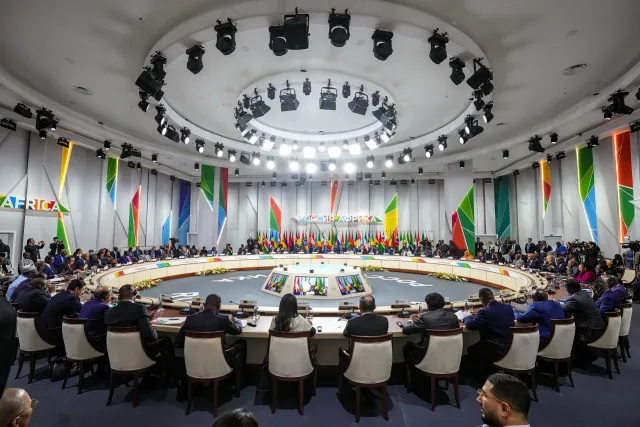
Foreign Ministers of the Russian Federation and African States have resolved to advocate for the formation of a fair and equitable system of security in the use of ICTs.
The ministers said this will prevent and peacefully resolve conflicts in the digital sphere, as well preventing the use of ICTs to disturb the maintenance of international peace, security and stability.
In a joint communique during the Russia-Africa Ministerial Conference in Sochi, Russia, the ministers said there is a need to improve the legal framework between States in the field of security in the use of ICTs at bilateral, regional and global levels.
“We confirm the importance of both observing the generally recognized principles of international law and developing a universal legal binding framework in the field of security in the use of ICTs under the auspices of the United Nations,’’ the ministers said in a statement.
They said they welcome the decision reached in the Open-Ended Working Group (OEWG) on the security of and in the use of ICTs 2021-2025 on the establishment of a single-track permanent negotiation mechanism on security in the use of ICTs in the United Nations.
The foreign ministers also said they endorse the agreement on key parameters, including decision-making by consensus and State led process.
“We recognize the need to endorse the relevant agreement during the 79th session of the UN General Assembly,” they said.
The caucus said they commend the launch of the UN Global Intergovernmental Points of Contact Directory with a view of enhancing a depoliticized dialogue between authorized agencies and specialists in the field of security in the use of ICTs.
“We confirm our commitment to promote efforts to improve and harmonize the domestic legislation of States to prevent, detect, suppress and investigate crimes committed with the use of ICTs, including terrorist and extremist activities,’’ they said in their communiqué.
They welcomed the finalisation of the historic United Nations Convention against Cybercrime and strengthened international cooperation for combating certain crimes committed by means of information and communications technology systems.
The ministers also said they endorse the sharing of evidence in electronic form of serious crimes elaborated by the UN Ad Hoc Committee under the Algerian chairmanship.
They said they looked forward to the adoption of the convention by the UN General Assembly during its 79th session and its early entry into force, affirming their commitment to strengthen international cooperation to combat cybercrime.
“We call for the timely development of an additional protocol to the universal agreement in order to expand the scope of criminalized acts committed with the use of ICTs, in accordance with UN General Assembly Resolution 74/247.
They called for increasing cooperation on various thematic platforms in the field of telecommunications and postal services and preventing politicization in violation of the charter documents of international organizations of the UN system and various forms of discrimination against its member States.
They said they will continue coordinating efforts to limit the functioning of low-orbit satellite Internet communication systems on the territory of sovereign states without their consent.
“We advocate for the internationalization of Internet governance, ensuring the equal participation of countries in this process while ensuring the integrity, stability and security of national segments of the Internet,’’ the ministers said.
The ministers called for equal access to ICTs, including artificial intelligence (AI), ensuring the safety of their use, as well as the need to develop fair technical standards and requirements in the field of AI.
They said they acknowledge the importance of regional efforts, set in the Continental Artificial Intelligence Strategy and African Digital Compact to accelerate Africa’s digital transformation by unlocking the potential of the new digital technologies.
“We call for Africa’s active and effective participation in AI development and undertake to jointly consider the promotion of funding and capacity building programmes to facilitate inclusive digital transformation in line with the Continental AI Strategy,’’ the ministers said.
The ministers supported the hosting of the African Conference on AI in 2025.
The ministers said they advocate for strict observance of the principles of the UN Charter and the national legislation of states by high-tech monopolies, as well as their responsibility for the safety of user's personal data and privacy.
“We are deeply concerned about the disruptive effect of unlawful unilateral coercive measures, which undermine the UN Charter and further restrain technological development of member states,’’ they said.
They reaffirmed their commitment to promoting respect for State's sovereignty and sovereign equality in the ICTs environment and opposed unilateral actions that could undermine international cooperation in this domain.
They emphasised the importance of joint efforts to build the
capacity of developing countries, including personnel training and technical
assistance, in countering evolving threats to security in the use of ICTs.
During the conference, a Russian cybersecurity company- International
Analytics Group at Positive Technologies-released an analysis of the cyber
threats facing the African continent with a focus on the years 2023-2024.
The report highlights a significant increase in attacks targeting government and financial sectors.
According to the company, the rise is mainly attributed to organised hacker groups driven by financial gain and espionage, along with a surge in hacktivist activity.
The report states that more than half of the databases
related to African countries are distributed for free on the dark web, with
access to corporate networks available for an average price of USD 2,970.
In Africa, the report shows that government institutions and
financial companies account for 29 per cent and 22 per cent of all successful
attacks on organisations, respectively.
According to the firm, an analysis of messages on dark web forums confirms that these sectors attract the greatest interest from cybercriminals, representing 19 per cent and 13 per cent of all darknet listings.




